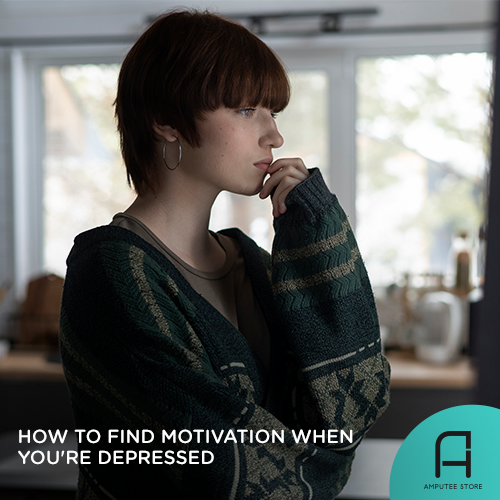How to Find Motivation When You’re Depressed
Everyone experiences a lack of motivation at some point, and finding yourself in this position can be challenging. You don’t want to do anything, yet you have a lot of things on your plate. While depression is one of the most common causes of lacking motivation, taking certain medications and having certain health conditions, like ADHD, can also contribute.

If your lack of motivation is caused by depression, you may find that your level of motivation is directly related to how depressed you’re feeling. Depression can be chronic, or it can occur along with traumatic life events, such as an amputation, death, illness, financial difficulty, and other disruptions.
Strategies for finding motivation
Overcoming depression and finding motivation may seem hard, but there are some things that you can do to help ease the severity of the situation. Below, we discuss some strategies that you can immediately implement.
Get up and change your pajamas
The act of getting out of bed and changing into your day clothes can be a small but vital victory to start your day. It can be challenging to do this on some days, but on other days, it might feel more manageable. It’s important to be patient with yourself.
You can also try surrounding yourself with positive affirmations, such as a quote on your phone wallpaper or a sticky note on your side table. Your mind absorbs the thoughts you create, so try to feed it positive ones.
Set small goals
When you lack motivation and feel overwhelmed, it can be tough to get started on anything. That's why it's important to start small and focus on one goal at a time. Pay attention to your energy and pace yourself. If you find that you can handle more tasks, take them on gradually. But if you're not up for it, that's okay, too.
Don't feel guilty if you only complete one or two tasks in a day. It's better to focus on one goal at a time and build up your confidence and motivation as you go.
Soak in nature
There have been numerous studies that suggest that being exposed to nature can have a positive impact on feelings of depression, stress, and anxiety. The Japanese have a practice called Shinrin-yoku or “forest bathing,” which involves spending time in a forest.
However, it doesn't have to be a forest. You can head to the beach or go for a hike on a trail to reap similar benefits. If you prefer to stay home, you can take on an outdoor hobby like gardening to achieve the same effects.
Avoid negativity
It is crucial to stay updated with the latest news, but prioritizing your mental well-being is even more essential. Constantly reading the news or scrolling through social media can take a toll on your mental health and leave you feeling exhausted. Moreover, it is essential to identify the people who have a negative impact on you during conversations and limit your interactions with them.
Instead, focus your energy on reading positive and uplifting content, listening to music, and surrounding yourself with people who bring you joy and positivity. Taking care of your mental health should be a priority, and it's necessary to take steps to maintain a healthy balance in your life.
Create a support network
Build your support network. These people can be crucial to your mental health when you feel like your motivation is running low. It's best to choose people who you feel comfortable talking to and who can encourage you. This group can consist of family members, friends, colleagues, or even people from your amputee support group.
If you're far away from your loved ones, consider volunteering. The social connectedness aspect of volunteering can help uplift your spirit, while the sense of purpose it gives can help you motivate yourself.
Boost your gut health
A healthy gut is better equipped to support your mental health. This is because there is a connection between your gut and brain. To support your digestive health, consume a nutritious diet rich in prebiotics, such as bananas and coca, and probiotics, like yogurt and kimchi. Studies have shown that fermented foods can improve mood by reducing anxiety and potentially alleviating symptoms of depression.
Get enough sleep
Depression can take a physical toll on the body, and sleeping too much or too little can affect mood. It is recommended to aim for seven to nine hours of sleep per night.
When to seek help
If you’ve been following the strategies outlined above without any significant improvement in your mood and motivation, we highly recommend seeking medical advice. A doctor can reassess your current treatment and offer you a combination of psychotherapy and medication that can help you cope with depression and lead a healthier, happier life.
Remember, taking care of your mental health is essential, and seeking professional help can be crucial to achieving it.










































































